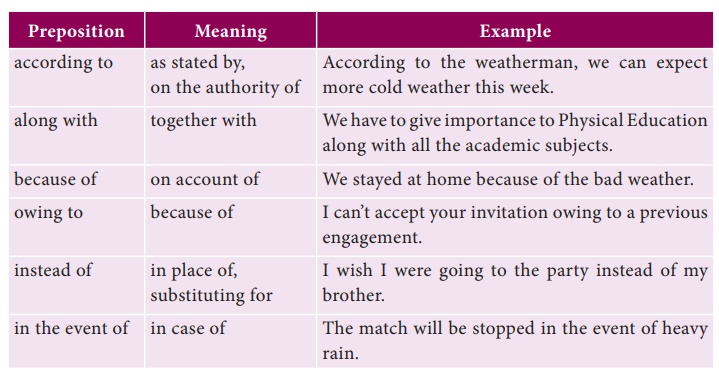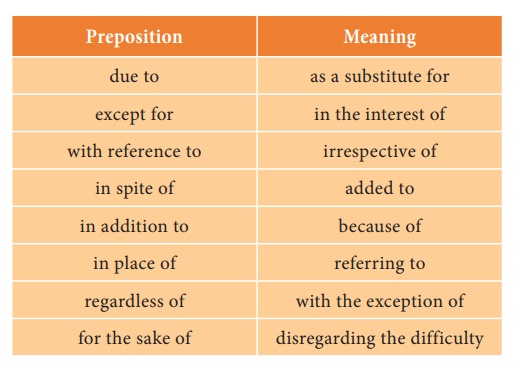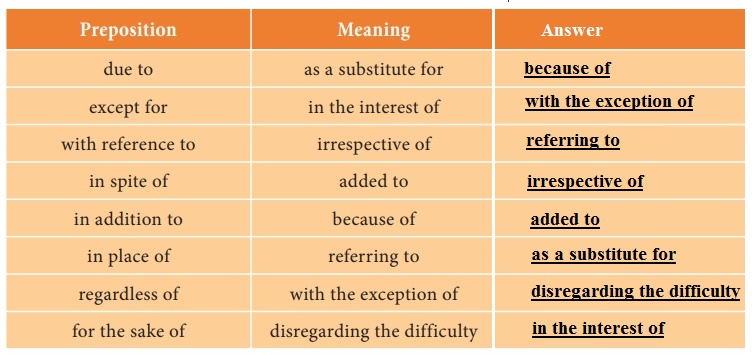Articles, Prepositional Phrases | The Night the Ghost Got In | by James Grover Thurber - Grammar | 10th English: UNIT 2 : Prose: The Night the Ghost Got In
Chapter: 10th English: UNIT 2 : Prose: The Night the Ghost Got In
Grammar
Grammar
Articles
A, An and The are called Articles.
We use a or an with singular nouns only.
(e.g.) A girl, An orange
We use a with singular nouns and adjectives which begin with a consonant sound.
(e.g.) A computer, A unit (yu+nit), A wonderful artist
We use an with singular nouns and adjectives which begin with a vowel sound.
(e.g.) An artist, An M.L.A. (em.el.a), An honest shopkeeper
NOTE
Words beginning with consonant letters do not always begin with consonant sounds.
Similarly words beginning with vowel letters do not always begin with vowel sounds.
(e.g.) Honour (sounds like – onour) European (sounds like yu-ropean)
We use the when a person, an animal, a plant, a place, a thing is mentioned for a second time.
(e.g.) I bought a book this morning. I am reading the book now.
We use the when it is clear to the listener or reader which person, animal, place, or thing we are referring to.
(e.g.) The judge found him not guilty.
We use the when there is only one such thing.
(e.g.) The earth goes round the sun.
We usually use the before ordinal numbers.
(e.g.) I live on the third floor.
We use the before some proper nouns such as :
(e.g.) The Indian Ocean, The Arabian Sea
We use the before names of most buildings, landmarks, monuments and natural wonders. (e.g.) The Park Hotel, The Taj Mahal
We use the before names of places containing of
(e.g.) The Republic of China.
The names of places ending in plurals.
(e.g.) The Andaman and Nicobar Islands, The Netherlands.
Some proper nouns are not preceded by an article.
· the names of continents - Africa, Asia
· the names of countries - Belgium, India
· the names of towns and cities. – Tokyo, Chennai
· the names of streets - Ritchie Street.
Some nouns can be counted and they are called as countable nouns; some cannot be counted and they are called uncountable nouns.
We use a or an only before countable nouns.
(e.g.) A leaf fell off the tree. (countable)
Rain can cause flooding (uncountable)
We use the with uncountable nouns, when it is clear to the reader which things we are referring to. We do not use the with uncountable nouns when we are talking in general. (Uncountable nouns do not take the plural forms).
(e.g.) The rice in this super market is good. Rice is the staple food of Asians.
The word some can be used with both countable and uncountable nouns in the following ways.
(e.g.) I want some apples.
I want some papers.
Nagarajan and Dhanalakshmi want to buy a new house. They have come to see a house for sale. Complete the conversation below by adding a, an or the.
Nagarajan : Well, here we are, No.8, Kaveri Street. I think this is the house we saw online. What do you think of the location?
Dhanalakshmi : It is in a nice neighbourhood. And it’s close to the railway station.
Nagarajan : And the bus stop is not too far away.
Dhanalakshmi : How many rooms are there?
Nagarajan : There are three rooms, a kitchen and a balcony.
Dhanalakshmi : There is a lawn behin the house, right?
Nagarajan :That’s right the lawn is actually quite large. Did you see any photos of the living room, online? What does it look like?
Dhanalakshmi : The living room looks great. It looks bright and airy. It has a nice view of the hills. But the kitchen looks a little small.
Nagarajan : And, I remember you said there isn’t a store room, right?
Dhanalakshmi : No, but there is an attic, where we can store things.
Nagarajan : I hope this house is a better option.
Dhanalakshmi : Lets wait for the real estate agent. She said, she would be here at three o’clock.
Nagarajan : Look there she is!
Few articles are missing in the given passage. Edit the passage given below by adding suitable articles where ever necessary.
My neighbourhood is very interesting place. My house is located in apartment building downtown near many stores and offices. There is small supermarket across street, where my family likes to go shopping. There is also post office and bank near our home. In our neighbourhood there is small, Green Park where my friends and I like to play on weekends and holidays. There is small pond near park and there are many ducks in park. We always have great time. In addition there is elementary school close to our home where my little brother studies in third grade. There are so many things to see and do in my neighbourhood that’s why I like it. It’s really great place.
Answer: My neighbourhood is a very interesting place. My house is located in an apartment building downtown near many stores and offices. There is a small supermarket across the street, where my family likes to go shopping. There is also a post office and a bank near our home. In our neighbourhood there is a small, Green Park where my friends and I like to play on weekends and holidays. There is a small pond near the park and there are many ducks in the park. We always have a great time. In addition there is an elementary school close to our home where my little brother studies in the third grade. There are so many things to see and do in my | neighbourhood that’s why I like it. It’s really a great place.
Prepositional Phrases
These prepositions are formed by two-word or a three- word combination such as according to, along with, at the time of, because of, owing to, instead of etc. These kinds of prepositions are used frequently in our day to day life.
Examples

C. Refer to the dictionary to find out the meaning of the following prepositions and match them with the correct meaning.


D. Fill in the blanks by choosing the most appropriate prepositional phrase from the given options.
1. Everything falls to the ground because of earth’s gravitational pull.
a. in addition to
b. because of
c. cause of
2. The trial was conducted in
accordance with the procedure of law.
a. in accordance with
b. due to
c. despite of
3. There is a temple right in front of my house.
a. in back of
b. apart from
c. in front of
4. As a result of of his hard work, he achieved the target.
a. instead of
b. result of
c. apart from
5. Failure is often the effect
of negligence.
a. effect of
b. consequence of
c. reason of
6. Children are given toys in addition to sweets on Children’s day.
a. on top of
b. in addition to
c. due to
7. The parents must be informed in case of any indiscipline conduct of their wards.
a. because of
b. in case of
c. in spite of
8. He didn’t turn up due to his busy schedule.
a. consequence of
b. due to
c. except for
9. Global warming is an effect of the green house emission.
a. an effect of
b. in spite of
c. in addition to
10. in spite of several warnings, he continued to swim.
a. due to
b. in spite of
c. because of
E. Edit the following passage by replacing the underlined incorrect words with correct prepositional phrases.
Janu is studying in class X. In the event of the teachers
she is a disciplined student. In addition to her poverty, she
is always neat. Many students like her in case of
her simplicity. According to her studies, she also
participates in sports. She gets on with everyone in case of
age and gender in the school. In opposition to taking leave, she ensures
that she completes the work given before she goes to school next day.
Related Topics